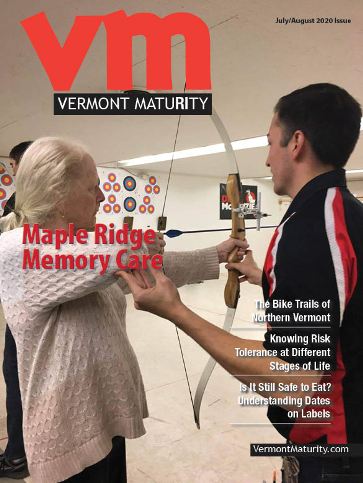About 60 percent of people who suffer from dementia wander at some point, according to the Alzheimer’s Association. For caregivers, this can be frightening because many of those who wander off end up confused and lost, even in their own neighborhood, and are unable to communicate who they are or where they live. Here are some product and service solutions that may help.

Simple Solutions
For starters, there are a number of simple home modifications you can do to keep your spouse from wandering away. Some solutions include adding an extra lock on the top or bottom of the exterior doors out of the line of sight or installing door alarms on the exterior doors that let you know when they’re opened. See AlzStore.com for a variety of product solutions. And, be sure you hide the car keys to keep them from driving.
You should also alert your neighbors that your spouse may wander so they can keep an eye out and have a recent picture of them on hand to show around the neighborhood or to the police if he does get lost.
Monitoring Technology
For high-tech solutions, there are a variety of wearable GPS tracking devices available today that can help you keep tabs on him. Some top options to consider include AngelSense (AngelSense.com), which can be attached to clothing or worn around the waist; wristwatches like the Theora Connect (TheoraCare.com) or NurtureWatch (NurtureWatch.com); and the GPS SmartSole (GPSSmartSole.com), which is a shoe insole tracker.
All of these products come with smartphone apps that would alert you if your spouse were to wander beyond a pre-established safe area and would let you know where to find them if they did. These products (except the GPS SmartSole) also provide two-way voice communication and auto pickup speakerphone so you can talk to them if they do wander off.
Locating Services
If the previously listed options don’t work for you, there are also locating services – like the MedicAlert + Safe Return program (MedicAlert.org/alz) and Vitals Aware Services (TheVitalsApp.com) – that can help you if he does wander off.
The MedicAlert + Safe Return program comes with a personalized ID bracelet that would have your spouse’s medical information engraved on it, along with his membership number and the toll-free MedicAlert emergency phone number. If they go missing, you would call 911 and report it to the local police department who would begin a search, and then report it to MedicAlert. Or, a Good Samaritan or police officer may find him and call the MedicAlert number to get him back home.
The Vitals Aware Service works a bit differently. This is a free app-based network system that comes with a small beacon that your spouse would wear. If they do go missing, anyone in the Vitals app network community that came within 80 feet of them would receive an alert and information about them so they could contact you.
Another option that could help, depending on where you live, is a radio frequency locater service like SafetyNet and Project Lifesaver, which are offered by some local law enforcement agencies.
With these services, your spouse would wear a wristband that contains a radio transmitter that emits tracking signals. If they go missing, you would contact the local authorities who would send out rescue personnel who will use their tracking equipment to locate them. Visit SafetyNetTracking.com and Projectlifesaver.org to see if these services are available in your community.
Jim Miller publishes the Savvy Senior, a nationally syndicated column that offers advice for Boomers and Seniors.
Related Articles & Free Subscription

Is Hearing Loss a Sign of Dementia?
Learning the Language of Dementia







Comment here